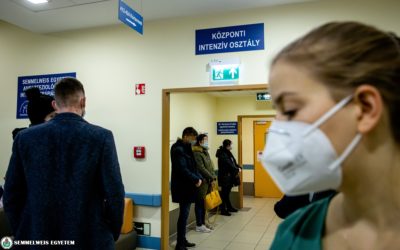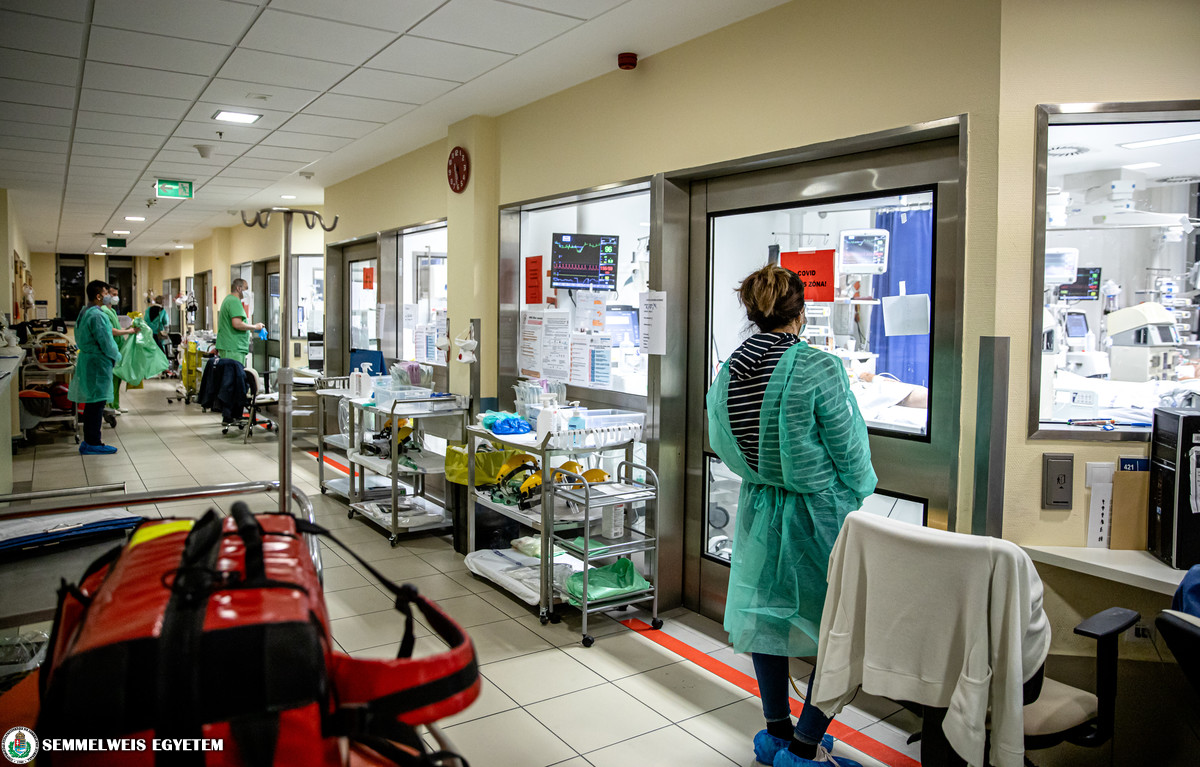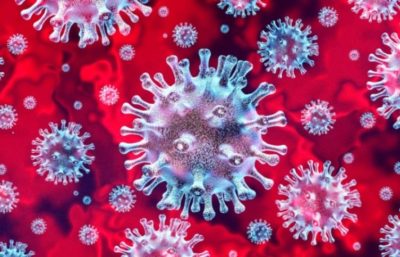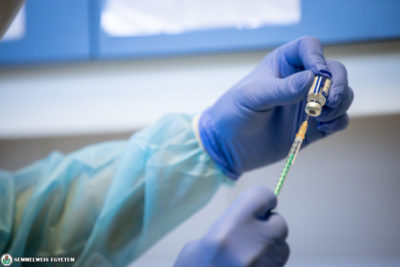Currently, there is a ban on visiting patients at all the departments of Semmelweis University, in accordance with current epidemiological regulations. However, in the case of patients who are in the most severe condition, it is possible for the relatives to visit and have the opportunity to say goodbye, under certain conditions, in the protective equipment provided by the department concerned. At the Department of Anesthesiology and Intensive Therapy, visitors are also provided with psychological help to prepare the relatives for the encounter. In addition, a psychological service for relatives and patients is available at several departments of the university, coordinated by the Department of Clinical Psychology.
With a few exceptions, visiting patients is not allowed during the ban on visiting ordered by the National Public Health Center in inpatient institutions, including the departments of Semmelweis University. However, even in this situation, it is possible for the relatives designated by the patients to visit a patient in a critical or end-stage condition and say goodbye, wearing the protective equipment provided by the department concerned. In addition, the regulation allows keeping contact for parents of child patients and the attendant of a woman delivering a baby. In justified cases, the contact keeping may be requested from the head of the department concerned on the basis of a leniency application, but even then only one designated person may be present with the patient.
Department of Anesthesiology and Intensive Therapy: presence of a psychologist during the visiting period
 “At the Department of Anesthesiology and Intensive Therapy, our psychologist is already present before the visiting periods, and he/she is also available to relatives on the phone at a specified time”, said Dr. János Gál, department head.
“At the Department of Anesthesiology and Intensive Therapy, our psychologist is already present before the visiting periods, and he/she is also available to relatives on the phone at a specified time”, said Dr. János Gál, department head.
As he added, the visits require serious organization, but provide a great deal of support to the relatives.
“Many people come to the designated visit without even being sure if they are willing to go to see their relative at all, because they are full of anxiety”, said Emma Naszvadi, psychologist, who provides help to the relatives to be able to prepare for what awaits them during the visit.
“Patients cannot be visited directly, and the relatives cannot talk to them, they can only see them through a glass wall and this in itself is a situation causing anxiety. Of course people would like to do everything for their ill relatives, to care for them, to hold their hands, but because of regulations related to isolation, this is not possible. This greatly enhances the feeling of helplessness”, the psychologist says.
As she points out, in addition, the intensive care unit is not the “usual” hospital sight that people usually imagine. Emma Naszvadi finds that it can be a stress reliever in itself if relatives can prepare for this.
“Since only one relative is admitted during a visit, it can alleviate even the difficult moments that one experiences alone if there is someone with whom the feelings can be shared afterwards, with whom one can sit down here for a few minutes in silence, with whom the experiences can be processed. Presence is what really matters at a time like this”, the psychologist says.
“There are those who are already coming in to say goodbye, they are at the beginning of sort of a mourning process. There was a case, when after such a last meeting, the relative concerned contacted me and we talked for an hour via Zoom. Then I recommended the person to contact an appropriate specialist, suggesting a longer therapeutic process. There are also those who do not ask for help there at that moment, but they prefer contacting me on the phone later. This is also possible”, Emma Naszvadi says.
 “Relatives ask a lot about what happens to patients at the department: whether they feel pain, if they remember later what happened to them, why they seem to be confused even days after waking up. It provides reassurance and some sort of a reference point to many people in case they receive answers to these questions, because it can be very scary if a patient awakened after a long anesthesia does not even recognize them, or is just disoriented in space and time”, the psychologist says.
“Relatives ask a lot about what happens to patients at the department: whether they feel pain, if they remember later what happened to them, why they seem to be confused even days after waking up. It provides reassurance and some sort of a reference point to many people in case they receive answers to these questions, because it can be very scary if a patient awakened after a long anesthesia does not even recognize them, or is just disoriented in space and time”, the psychologist says.
As she points out, they, experts know that this is a “normal” part of the process, which dissolves over time, but it is an unknown situation to the relatives. It is considered to be important that they are also properly informed, which is why professionals have created a detailed information page about this, but of course there is opportunity to ask questions during the visits as well.
Unlike general COVID care facilities, packages cannot be sent to intensive care and emergency departments, but relatives may write a letter to their loved ones. To those inpatients, whose condition is more serious, the relatives may even send a voice message, in the case of which Emma Naszvadi is happy to advise on its content. In such cases, it is worth recalling memories in which the patient has solved a difficult situation, achieved success, as this can also activate the psychic ability to cope, and the recalling of pleasant shared memories can have a calming effect. In the letter, the relatives can write down exactly what is happening at home so that the patients can keep up with the family life, and it is also worth writing down things that they will do together after the patient is released from hospital and can go home.
“Our goal for the relatives is not to experience being <excluded>, although this may seem like this at first because of the regulations related to isolation, but to involve them as much as possible in the process, as they are also part of it. We emphasize that they should also pay attention to their own needs, try to relax, recharge, as the organization of life after the hospital treatment will be handled by them, for which they will need strength”, the psychologist highlighted.
Department of Clinical Psychology: support provided at many departments
Psychological help is also available at other departments on campus. As Dr. Dóra Perczel-Forintos, Head of the Department of Clinical Psychology said, already at the beginning of the epidemic, they responded quickly and developed such self-help material that could provide advice to both patients and relatives in dealing with difficult situations. She added that residents of the Department of Clinical Psychology provide psychological support to patients and relatives at several departments on campus as part of their work, both by phone, online or in person.
Residents of clinical psychology are currently available at the following departments in person or via the e-mail address available in the university’s central telephone directory:
-
1st Department of Surgery and Interventional Gastroenterology: Márton Kiss-Leizer
-
Department of Transplantation and Surgery: Judit Mezei
-
Department of Obstetrics and Gynecology: Anna Knyihár and Barbara Kulig
-
Department of Internal Medicine and Oncology: Illés Kovács
-
Department of Internal Medicine and Hematology: Tímea Kele
-
1st Department of Pediatrics Perinatal Intensive Care Unit: Andrea Lohn
-
1st Department of Pediatrics: Martina Greskó
-
2nd Department of Pediatrics: Réka Katona
-
Department of Pulmonology: Tamás Szekeres
“We continuously provide professional supervision to our resident clinical psychologists participating in the front line of epidemic control to support the care of the more serious cases, and as a background institution we provide therapeutic assistance to patients and their relatives at the department’s outpatient clinic”, Dr. Dóra Perczel-Forintos emphasized.
Psychological support also has a preventive value
Dr. György Purebl, Head of the Institute of Behavioral Sciences, also emphasized the preventive value of the psychological support system created for relatives. As he said, the university’s psychological care units, including the Institute of Behavioral Sciences, provide care for more and more people with psychological problems (stress, panic disorder, grief) related to COVID-19. Experience in the psychological preparation of relatives of critically ill patients has shown that in many cases it can prevent pathological grief, depression or other mental disorders. The institute head recalled that during the first wave of coronavirus, a guide for the home care of COVID-19 patients was prepared in collaboration with the Department of Family Medicine and the Department of Clinical Psychology, which briefly summarizes the essentials of home care and how to maintain the mental health of the patient and the relatives caring for him/her.
Bernadett Bódi
Photo: Attila Kovács – Semmelweis University
Translation: Katalin Illés-Romhányi


